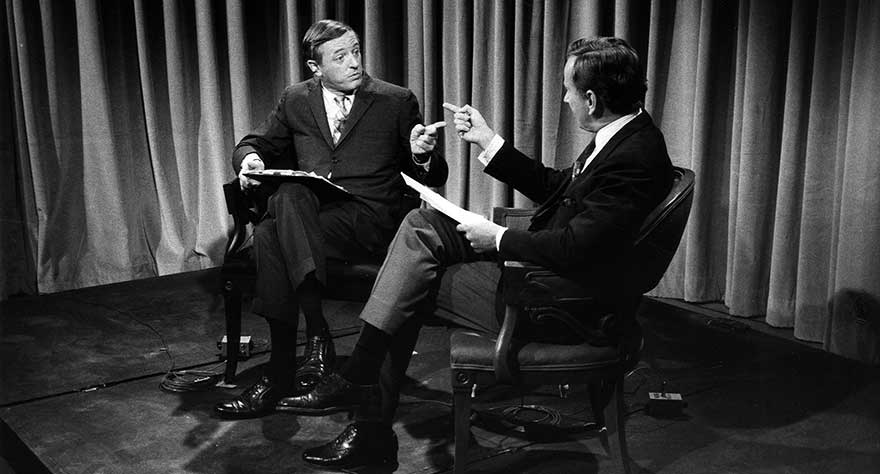
This crackling doc about the birth of televised debate is a fun watch that eventually gets lost in its own bombast.

This crackling doc about the birth of televised debate is a fun watch that eventually gets lost in its own bombast.
Long before I cut the cord, I had all but abandoned cable news networks. Their coverage of large, breaking stories was always good enough (or at least swift enough), but the routine programming hours had become littered with too many stories posing as news, narrated by too many talking heads posing as journalists. It wasn’t just the news that suffered, though. The televised arena for political discourse, which was once like a boxing ring where combatants approached each other in measured debates, had become more akin to professional wrestling, where discourse became an exercise in one person waiting for their turn to yell instead of actually listening to what their opponent was yelling in the first place. Multiply that by the maximum number of onscreen boxes to house all those screaming heads, and what remained was mostly noise. Cable news outlets might have perfected this type of sweltering, sharply divided rage-debating, but they didn’t invent it. That honor is shared by the subjects of Best of Enemies, a crackling documentary from co-writers/directors Robert Gordon and Morgan Neville.
The film focuses on 1968 when ABC was a network in shambles. While rivals NBC and CBS prepared to provide gavel-to-gavel coverage of the Democratic and Republican National Conventions, ABC was looking to do something different to save money. They abandoned the full-tilt coverage strategy, instead hiring conservative pundit William F. Buckley Jr. and liberal author Gore Vidal to engage in a series of ten televised political debates. The fierce dislike each man had for the other was like nothing people had ever seen on television before. How those men debated is like nothing people have seen since.
Best of Enemies is a history lesson and an origin story the likes of which I haven’t seen before. While Gordon and Neville don’t draw a solid line from Buckley/Vidal to the opinionated news programs littering the dial today, they make it clear these are the men on whose shoulders today’s pundits stand.
The film delves into the individual histories of Buckley and Vidal, and it draws clear comparisons between the two—from their lives of affluence to their intellectual successes and failed political aspirations. It also uses their success in publishing to set a stark contrast: Buckley founded the successful conservative magazine National Review, while Vidal wrote the satirical novel Myra Breckinridge which, light years ahead of its time, featured a transgender lead character. Buckley, a staunch Catholic, particularly loathed this achievement of Vidal’s (citing moral issues), and Vidal particularly loathed Buckley for supporting nuclear weapons. There were other reasons for both of them to dislike each other, of course. Regardless, their paths were meant to cross on a political stage, and cross they did for all of ABC’s viewers to see.
Their debates, often personal, usually scathing, are dazzlingly erudite, with vocabulary and references that, in today’s soundbite-driven world, would elicit the sound of a needle dragging across a record followed by the host asking, “Uh, what?” It’s actually invigorating to hear, particularly as delivered with such dueling arrogance by these men with their entitlement and elitism. In its pure form, their collective debates demand the viewer to be smarter instead of playing down to a common Nielsen Rating denominator.
Like two boxers going 10 rounds, these men score points with each debate, a path that ultimately leads to the explosive confrontation in the ninth round … er, debate … where Vidal calls Buckley a “crypto-Nazi” and Buckley, in an uncharacteristic loss of cool, calls Vidal a queer and threatens physical harm.
Ring the bell. Vidal in nine.
There are other historical materials present in Best of Enemies, including the politics of the time, the state of network news at the time, and the periphery of the conventions, but this is given in smaller bits. In fact, this lack of a fuller historical context, coupled with the aforementioned lack of a solid line between these debates and the cable news programs of today, is the ironic flaw of the film. While it’s making the case that these were brilliant men who were aware of the power of TV (yet never compromised for it), the film focuses on the sexiest parts of their history to get the most attention, instead of presenting a greater historical portrait. Not even making a cable-like move by casting a couple of celebrities (Kelsey Grammer and John Lithgow) to do some narration, and gathering a collection of powerhouse talking heads including the likes of Christopher Hitchens to break down some details, can’t quite make it a complete picture. This doesn’t make the debates any less fun to watch, but it leaves the viewer wanting something more.
Television hasn’t been the same since these debates, for better or (mostly) worse. Not only did these two intellectual titans unknowingly lay the foundation for what televised debates parade themselves to be today, they did so with such a high degree of erudition that they would probably not survive in today’s bumper soundbite-driven world of punditry. That’s too bad, because while screaming for the sake of screaming grows quickly tiresome, screaming with rapier-like intellect is something to behold. Despite its flaws, Best of Enemies revels in that old magic, creating a yearning for a time when the periphery was simple and the content was complex.